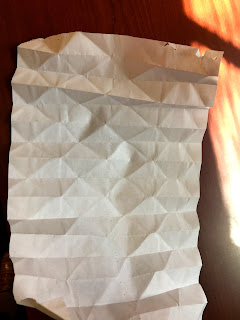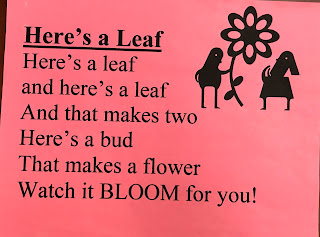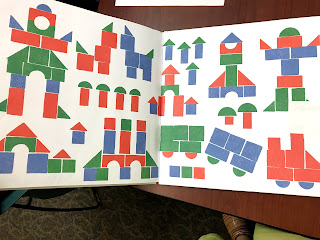This week was our final Book Look Storytime and we were examining gutters. Just in case you don't know already, gutters are the crease at the center of the book, where the binding comes together. All of the books above make interesting and effective use of the gutters. Let me show you a few examples:
In Jon Agee's new book, The wall in the middle of the book, a gutter becomes a brick wall that literally divides one side of the book from the other. There's some question about which side is the "safe" side and in this spread, the ogre manages to reach OVER the wall by escaping the confines of the pages themselves:
The group pointed out that the cover of the book is a great preview for the story but from a different perspective. (Note the creeping water in the bottom left corner...)
The gutter in Chris Raschka's classic Yo! Yes? divides two characters, isolating them, until they realize that they can be friends with each other and then the get together on the same side of the book. We also talked about the subtle background color changes in this book and how they reflect the mood of the characters.
Suzy Lee's book, Shadow is an amazing and unique example of gutter use and this mostly wordless text brought lots of emotional responses from listeners.
In the book Blocks by Irene Dickson, Ruby and Benji are playing separately with their red and blue blocks, safely divided by the gutter. Until this page:
Look at all the action happening right across that gutter! I asked the kids what they noticed and they said, "lots of movement!" one kid thought that the little black lines were hairs flying all over the place, but another child informed us that they were wiggle lines.
When they reconcile their differences and build something together, the apex of their structure is... right over the gutter!
Our fingerplay today was:
Two tall telephone poles, (pointer fingers up!)
Between them a wire is strung. (tips of middle fingers touch each other)
Two little birds hopped onto the wire (thumbs are the birds)
And they swung, swung, swung. (swing it back and forth)
We did the app OLO Game because the action in that game is all about crossing the gutter!
Today's art invitation was to fold the paper and make use of the gutter in your art. Here are a few examples:
All in all, this has been a really interesting series, but not well-suited for the three-and-under crowd. While I will likely still pull in some of these techniques for one or maybe two books during my regular preschool storytime programming, doing an entire storytime based on this approach lost a few of the more active younger kiddos and some of the older kids got impatient and begged me to "just read the story!" But I love asking kids what they notice because it's often a revelation to me and I even loved letting them choose which book I read from a selection of titles standing up on a table. It's as close as I can get to a "self-determined storytime"!







































